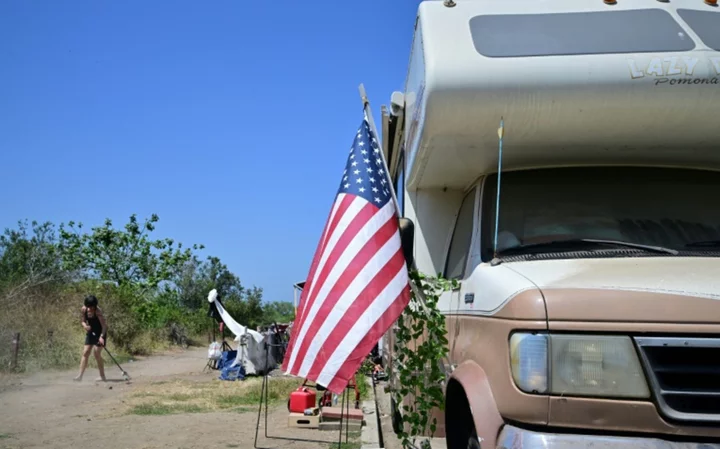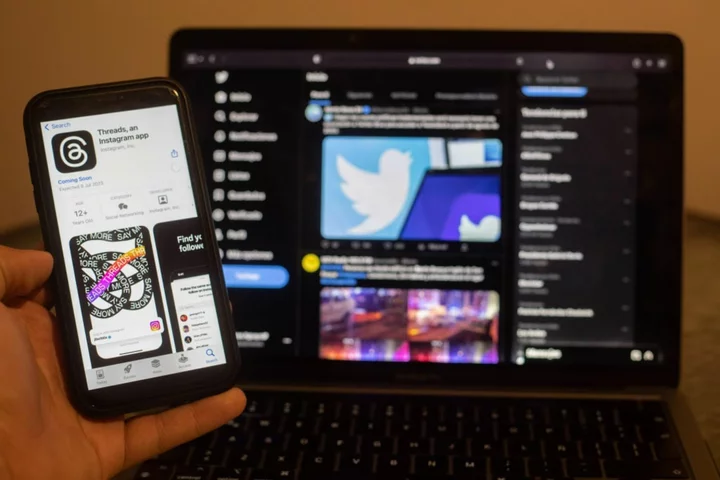Tamara Hernandez moved into a recreational vehicle when her rent shot up. Beau Beard did it because he lost everything after going to prison.
Stories like theirs abound in California where RVs and trailers, once a symbol of carefree living by the ocean, increasingly reflect a less glamorous slice of life in the Golden State: a housing crisis and the growing number of people without a roof over their head.
A third of all the homeless people in America live in wealthy California, which if it were a country would boast the world's fifth-largest economy.
In Los Angeles County alone more than 75,000 people are homeless, Los Angeles Housing Services Authority statistics say.
And while figures are difficult to pin down, those same statistics show that more and more of them are living in recreational vehicles, trailers, vans or cars that have formed makeshift camps in Los Angeles and nearby towns.
"That's all I can afford," Beard said as he points to his recreational vehicle, parked on a narrow street near the busy, touristy beach in the town of Venice.
Beard moved to California seeking a fresh start after he got out of prison nearly eight years ago. But things did not work out as he had hoped.
The average rent in Los Angeles was $2,950 a month in June.
And the problem of surging housing costs is not confined to California. In 2021, more than seven million Americans in the United States spent more than 50 percent of their income on housing -- an increase of 25 percent since 2007, according to a study by the National Alliance to End Homelessness.
On top of that, says Bear, "there's no jobs." At his age -- 57 -- people are reluctant to hire, he said.
When his girlfriend got pregnant in 2020 Beard bought the RV to house his family. But city officials took the baby away shortly after its birth on grounds that an infant cannot live in such meager lodgings.
"It's been the worst experience of my life," he says.
Not only did the vehicle cost him his daughter, it has also left him in a grey area when it comes to any chance of subsidized housing, he continues.
"They say that we're not homeless. But we are homeless," he explains.
"So as far as giving out housing and stuff like that, we're last on the list."
- 'No parking' -
His RV is in a line of vehicles parked on a thoroughfare called Jefferson Boulevard, which runs along the Ballona Wetlands Ecological Reserve.
Many of the vehicles, parked next to "No Parking" signs, have been here so long that they feature art installations, little gardens, tables and chairs, and stoves for cooking.
Some people have dogs, and the residents are a mix of people born in the US, Europe and Latin America. They have a sense of community, with rules of behavior, and look after one another.
But life here is very hard.
"It takes, like, 10 steps to do one thing," said Hernandez, a makeup artist who moved out of her apartment in Venice when, over the space of just a decade, the rent rose from $450 to $3,000.
To bathe, for instance, it takes her an hour to heat up enough water.
Then there is the stress of living with the feeling that people look down on you, or worse.
"I don't know why they hate us. Like, it's ridiculous. Like, we are good people," said Hernandez.
- 'The only way' -
Another resident of the encampment is a man named Steven who did not want to give his last name. He works in a supermarket and parked on Jefferson Boulevard two years ago to live with his wife.
They bought the small van they live in for $6,000, because their two salaries were not enough to rent a place in a decent neighborhood.
Still, he said it is better than living in areas with gang and drug problems.
Steven said that in order to pay rent of $2,000 or $3,000 a month in an average middle class neighborhood and cover basic expenses he would need to work not two jobs but three.
"This is the only way I think we would be able to survive after the inflation happened, because jobs, wages, haven't gone up," he said.
Like in other US cities, homelessness has risen in Los Angeles as people struggled with high costs for housing and other needs while inflation bit deep -- prices across the country rose by 6.5 percent in 2022.
But there is a glaring contrast here in the hub of the world's entertainment industry: lovely mansions up in the Hollywood hills while homeless people sleep on streets such as the Walk of Fame.
pr/dw/st/tjj









